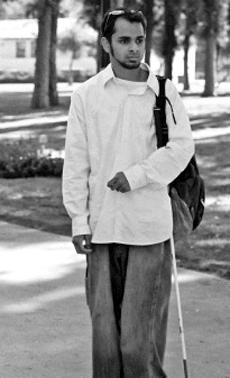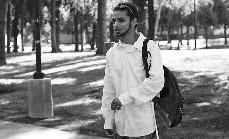Massimo Cibelli
Umair Ibrahim attends school like any other student.
He patiently rides the city bus, walks to class with a friend, does his homework and prepares for the next day.
There is only one mountain that stands in his path; for Ibrahim, a driving force.
He is blind.
You might catch him walking to class, while you’re hurrying to check your MySpace on the library computers.
His eyes are hidden behind dark glasses.
His fingers are wrapped around a guide stick.
His walk exudes self-respect and confidence.
This young man of 21 years has everything to be proud of, considering the fact he is a constant motivation for many students.
“A lot of people come up to me and tell me how I motivate them.
“It makes me feel really good that I can do that,” said Ibrahim.
“My intention is not to motivate, but it so happens that I do. I like it.”
Ibrahim was not born blind.
In fact, his vision was normal before middle school, during which it started to deteriorate.
Thereafter, his lack of vision intensified in high school, officially labeling Ibrahim as visually impaired.
“If I’m outside and take my glasses off, I see pure white and very few shadows,” said Ibrahim.
“That doesn’t stop me.”
He does still have some limited vision indoors.
He is able to watch movies by turning off all lights in the room and sitting very close to the television.
One of his all-time favorite movies is “Airplane,” especially after finals are over, for which he hails it as a “brainless comedy.”
Ibrahim is currently enrolled in Anthropology 101, Anthropology Lab, Statistics, Economics and two music classes (harmony and musicianship).
“Labs are hard, because of all the paperwork.
“It’s ok, because friends help me out.
“I’m very grateful for that,” said Ibrahim.
In order for Ibrahim to properly study and do homework, he uses a special instrument called Closed Circuit Television (CCTV), which is a magnifier machine.
For example, he’ll put his economics textbook under the special magnifier, which projects it onto a T.V.
It then magnifies the image and transforms it into a negative, which enables Ibrahim to see clearly.
“I don’t use the CCTV in class,” said Ibrahim.
“I hate negative attention and getting put on the spot. I’m glad I don’t use it in class.”
He listens carefully and uses his imagination during lectures.
While on his personal computer, Ibrahim uses ZoomText, a magnifier program built in that enhances everything on the computer screen, making all applications easy to see and use.
Surprisingly, studying at school is less convenient than studying at home.
“Pierce can do two things to make it easier for visually impaired students. One would be access to Etext.
Etext entails taking a book, scanning it onto a PDF, then viewing it through my laptop in class.
“It magnifies the image so I can see it and is a lot more effective and quicker than CCTV.
“Another thing they can do is have more CCTVs available. As of right now, they only have two, and both are older than me.”
One of the CCTVs is located in the Resource Center.
According to Ibrahim, the machine is fair.
The other one, which is poor in quality, is located in the library.
According to Norm Crozer, the director of special services, “We are in the process of buying a new (CCTV) for the library.”
Aside from school, Ibrahim plays drums, piano and runs his company, Unique Sound Innovation – a mobile DJ service for private parties.
Considering the success he has in school and his five-year-old business, he struggles to meet people who treat him like a normal guy.
“I want someone to be real with me. I don’t consider myself to be disabled.”
Born in Karachi, Pakistan, Ibrahim flew to the U.S. with his family at a very early age.
He traveled from state to state until he settled down in the San Fernando Valley.
“People here are extremely friendly. I always have someone that insists on walking with me to class.
“It makes them happy and it makes me happier.”
He plans on transferring to CSUN next fall to earn a degree in both music and business.
He has completed over 90 units, and looks forward to finishing his double major.
“As soon as I graduate, I want to take a loan out and open a recording studio,” said Ibrahim.
“I know I have a long way to go, but I’ve gone this far and there is no turning back.
“I will succeed.”

Despite loss of vision, Umair Ibrahim studies with the aid of magnification tools such as CCTV. Norm Crozer, director of special services, says Pierce is getting a new one of these for the library. ()

sonia gurrola / The Roundup ()



